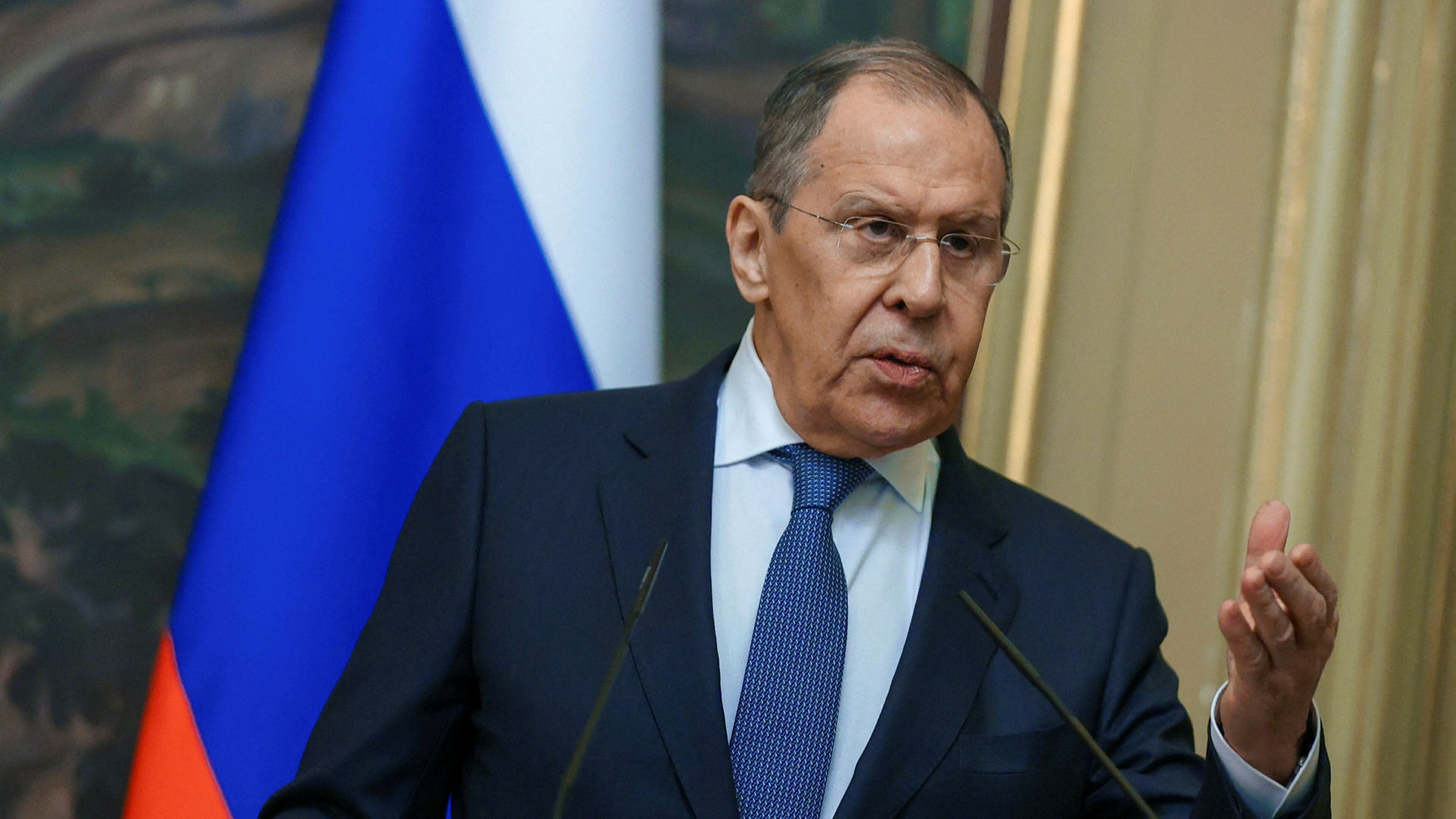Russia says Western powers have the ambitions of a nuclear war, but Moscow will press on with its military operation in Ukraine until “the end.”
“The thought of nuclear is constantly spinning in the heads of Western politicians but not in the heads of Russians,” Russian Foreign Minister Sergei Lavrov said in an interview with state television on Thursday.
“I assure you that we will not allow any kind of provocation to unbalance us,” Lavrov said, stressing that Moscow will insist on the provisions that would prevent Ukraine from becoming a military threat or joining NATO.
He accused NATO of seeking to maintain supremacy over Russia, saying his government would not let anyone undermine the nation’s interests.
He also accused Ukrainian President Volodymyr Zelensky of presiding over “a society where Nazism is flourishing”.
Lavrov further hit back at Ukrainian claims that civilian areas are being attacked. He said Russian troops have strict orders to use high-precision weapons to only destroy military infrastructure and not residential areas.
Russia, he said, has a good will and a solution to the crisis in Ukraine would be found.
Ukraine presidential adviser: 2nd round of talks with Russia have started
Lavrov's remarks came as Ukrainian and Russian officials started their new round of talks in Belarus, according to a Ukrainian presidential advisor.
Mykhailo Podolyak said the Ukrainian delegation's agenda is to agree an immediate ceasefire and humanitarian corridors to allow civilians to leave front line communities.
Ukrainian negotiator Davyd Arakhamia wrote on Facebook that Kiev plans to discuss setting up humanitarian corridors at the first place.
Ukrainian negotiator: No breakthrough in Russia talks
Following the conclusion of the second round of talks between Ukrainian and Russian delegates, a Ukrainian negotiator said the talks with Russia had not yielded the results Kyiv hoped for, adding that the negotiating sides had discussed humanitarian corridors and agreed to speak again.
"To our great regret, we did not get the results we were counting on," Ukrainian presidential adviser, Mykhailo Podolyak, said.
"The only thing I can say is that we discussed the humanitarian aspect in sufficient detail, because quite a lot of cities are now surrounded. There is a dramatic situation with medicines, food, and evacuation," Podolyak said.
He added that the two sides envisaged a possible temporary ceasefire to allow for the evacuation of civilians.
"That is, not everywhere, but only in those places where the humanitarian corridors themselves will be located, it will be possible to cease fire for the duration of the evacuation," Podolyak said.
Russian negotiator: Progress made on Ukraine humanitarian corridors
Russia's chief negotiator to the talks, Vladimir Medinsky, however, noted that his country has agreed to support the idea of humanitarian corridors for civilians and a possible ceasefire around them. He described the decision as "substantial progress."
The conflict in Ukraine is forcing tens of thousands of people to seek refuge in neighboring countries, which has also sparked questions of discrimination against non-Europeans fleeing the war.
IAEA adopts resolution, 'deplores' Russian invasion of Ukraine
In another development on Thursday, the Board of Governors of the International Atomic Energy Agency (IAEA) adopted a resolution on Thursday, "deploring" Russia's military operation in Ukraine and urging Moscow to let Ukraine control all its nuclear facilities.
Russia, which voted against the resolution along with China, said it was based on "politically motivated lies and mistakes."
The resolution, which was passed at an emergency meeting of the 35-nation Board, was called by Canada and Poland on Ukraine's behalf.
It urges Moscow to "immediately cease all actions against, and at, the Chornobyl Nuclear Power Plant and any other nuclear facility in Ukraine, in order for the competent Ukrainian authorities to preserve or promptly regain full control."
Reacting to the resolution, Mikhail Ulyanov, which represents Russia in international organizations in Vienna, including the IAEA, tweeted that the resolution “contains intentional politically motivated lies and mistakes.”
The Russian ambassador added that the resolution “abuses extremely important topic of nuclear safety and security for purely political purposes.”
UN rights chief criticizes discrimination African, Asian nationals fleeing Ukraine
In a related development on Thursday, UN High Commissioner for Human Rights Michelle Bachelet said in statement on Thursday that the acceptance of refugees from neighboring countries “must be extended to all those fleeing conflict, regardless of their citizenship, ethnicity, migration or other status.”
“There have been disturbing indications of discrimination against African and Asian nationals while fleeing, and the Office will be watching this situation attentively,” Bachelet added.
She added that tens of millions of people in Ukraine are in "potentially mortal danger" as military operations escalate in the Eastern European country.
"Over two million people have been forced to flee their homes. One million, according to UNHCR estimates, are internally displaced. A further 1,040,000 refugees have sought safety in neighboring countries in the past seven days – often after travelling for days by bicycle or on foot, in freezing conditions. UNHCR has estimated that up to four million people could leave the country in the coming weeks if the conflict continues," Bachelet said.
Germany helps Ukraine with more armaments
On Thursday, Germany said it will send 2,700 anti-aircraft missiles to the conflict zone in Ukraine.
A German official source said his government “approved further support for Ukraine,” involving the delivery of STRELA-type anti-aircraft missiles of Soviet manufacture.
The military aid comes on the heels of a previous dispatch of 1,000 anti-tank and 500 anti-aircraft missiles to the front, German government said on Wednesday.
Other European countries have also announced that they would speed up weapon supplies and other military assistance to help Ukraine repel Russian advances.
Russia's President Vladimir Putin announced last week a “special military operation” in Ukraine’s Donbas region to “defend people” subjected to "genocide", stressing that Moscow had “no plans to occupy Ukrainian territory”.



























